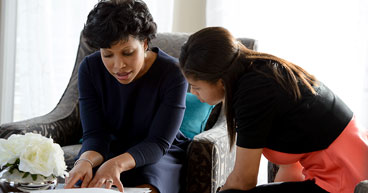
Receiving a cancer diagnosis can be like a rock has been dropped in the middle of your otherwise placid and peaceful world—the ripples of emotions, fears and questions quickly expand into an ever-widening wave of concern.
What caused my cancer?
What did I do wrong?
How am I going to pay for this?
When am I going to die?
But while patients may ask a lot of questions in the minutes, days and weeks after a cancer diagnosis, they may not always ask about the more immediate and pressing priorities at hand. Doctors often walk that fine line of allowing patients to vent their emotions and ask questions while keeping them focused on the potentially lengthy to-do list, including scheduling appointments and developing a treatment plan.
“It's kind of like if you go to a restaurant and they have hundreds of things on the menu and you don't even know where to start,” says Jeffrey Metts, MD, MPH, Chief of Staff at City of Hope® Cancer Center Atlanta. “So, sometimes I’ll say: ‘Today, here's what I'd like you to do. I'd like you to focus on these things.’ You try to keep the message as simple as you can whenever possible.”
In this article Dr. Metts and Anthony Perre, MD, new patient intake physician at City of Hope Atlanta, offer some advice on what cancer patients should focus on in the first week or so after their diagnosis. Topics include:
- Learn about your cancer type
- Ask about cancer treatments and side effects
- Bring a wingman to oncology appointments
- Find cancer support
If you’ve been diagnosed with cancer and want to get a second opinion of your diagnosis or treatment plan, call us or chat online with a member of our team.
Learn about your cancer type
It’s critical in the early days of a patient’s cancer journey that doctors learn as much as they can about the specific type of cancer, its stage and what may be driving its growth.
The more you know about your cancer diagnosis, the more you can be an active participant in not just getting tested, but also in developing treatment and survivorship plans moving forward.
“Being able to identify cancers early gives patients more options,” Dr. Metts says. “Being able to get information about a cancer once it's diagnosed sooner rather than later gives us more options. Don’t ignore what's happened. Let's get educated about it. Let's get a plan together.”
Patients’ interest in the minutia of their cancer varies doctors say. Some patients want to know every last detail, says Dr. Perre.
“It’s incumbent on the physician to give them that information, but also to sift through some of the information that's not relevant and let them know why it's not relevant,” he says.
Ask about cancer treatments and side effects
Cancer treatments often cause difficult side effects. Chemotherapy may cause digestive issues, neuropathy or hair loss. Some immunotherapy treatments may cause an over-active immune system that may cause auto-immune-like symptoms.
Drs. Metts and Perre say its best for patients to try to understand what side effects may occur and not to be blindsided by unexpected reactions to treatment.
“Patients should ask about side effects to expect or things to watch out for during the treatment that may put them in jeopardy,” Dr. Perre says. “For instance, having cancer puts a person at risk for things like blood clots and lungs infection. By knowing what to expect along the course of treatment, including what side effects to expect, can help you anticipate them and potentially help to better deal with them.”
Bring a wingman to oncology appointments
Dr. Perre is not just a doctor at a cancer hospital, he was once a cancer patient. Diagnosed with Stage 2A Hodgkin lymphoma in 2007, Dr. Perre remembers being overwhelmed by the flood of information about his disease.
“What I remember from my own experience is that when I went to see my oncologist it was so overwhelming at times and it's not easy to comprehend everything that was said,” Dr. Perre says. “I’m a physician and yet I still found that I was missing about half of what was explained to me.”
Drs. Perre and Metts encourage cancer patients to bring someone with them to consultations, tests and treatments. A close friend, family member or caregiver can drive you to appointments, take notes during consultations and offer comfort and reassurance.
“It’s always good to have an extra set of ears in the room,” Dr. Perre says.
“There's often a tendency to withdraw and suddenly feel very alone after a diagnosis,” Dr. Metts says. “I've recognized over the years the value of a caregiver, someone in your circle of trust, who can sit next to you when you’re talking to doctors. It may be very challenging to pay attention and to listen. It’s as if suddenly everything is kind of echoing in the distance as you get into your own thoughts and you stop being able to hear and listen to the person talking to you.”
Find cancer support
Some patients may travel on their cancer journey alone, either by choice or by circumstance. Not everyone has a caregiver or loved one nearby.
Still, support is available for those patients who choose to reach out.
Cancer Fighters, for example, is a community of City of Hope cancer survivors who offer information and shared experiences to new patients and caregivers.
Virtually every type of cancer has its own informative websites or set of specific support groups, such as breastcancer.org or the Leukemia & Lymphoma Society.
The National Cancer Institute and American Cancer Society also offer information on how to find support groups for your cancer online or in your community.
“Family support is very important, but if you don't have the family support there are multiple organizations that are out there to help,” Dr. Metts says. “Support groups can help patients navigate through their journey and help patients with some of the important questions you should be asking and may not even know.”
If you’ve been diagnosed with cancer and want to get a second opinion of your diagnosis or treatment plan, call us or chat online with a member of our team.



